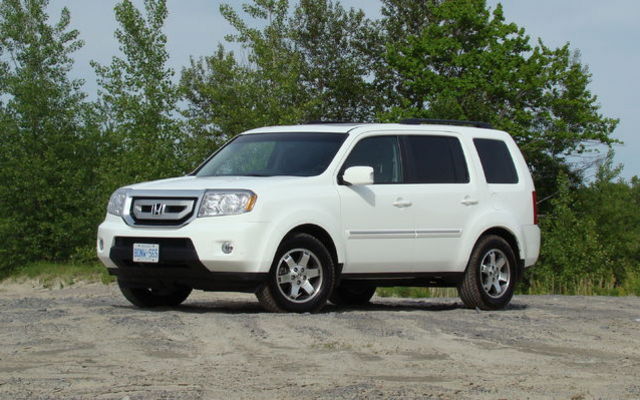The 2009 Honda Pilot, more than meets the eye

Every time I go by a 2009 Pilot, I wonder just how many designers at Honda are in need of glasses. In my mind it’s absolutely inconceivable that anyone could put out a car that ugly and expect it to sell – much less be a success. But since I find myself pondering the same thing fairly often, I guess that means there’s a fair number of Pilots out there. So, does that mean that I fall into a relatively small group of people who can’t stand this vehicle’s lines, or does it imply that Honda’s reputation is such that consumers are willing to look past the Pilot’s looks?
Personally, after taking into account Honda’s sales (which in this category are lower than those of GM, Ford and Toyota) I concluded that sales of this kind of crossover vehicle have increased over the past few years. That may come as no surprise to you, given that sales of intermediate SUVs have plummeted, as they are considered as a little too much nowadays. Which is not to say that crossovers have delicate appetites. However, while crossovers are enjoying some popularity overall, I’m sure they could have sold more Pilots had the design been more visually appealing.
All in one
Honda’s explanation for creating such a hefty vehicle is that buyers want rugged vehicles. In fact, Honda believes that SUV if sales are down, it is not just because they guzzle too much gas, but also because manufacturers have been too conservative with the design. Honda also knows that buyers are looking for huge cargo holds, good off-road capabilities and towing capacity, and the looks of a truck. So, they decided to combine all of these features in one vehicle with a modern engine and unitbody chassis, which they say is as solid as a ladder chassis.
Obviously, none of this is an excuse for such an unsightly front grille and hideous optical blocks. As for the windows, they clearly seem to have been inspired from the latest Jeep Liberty. None too original! Oh well, at least we can understand what the brand strategists were thinking when they designed this bulky vehicle.
Thankfully, the aesthetics are better inside. Overall, the look is more modern and elegant, the fit and trim is well done and there’s a good amount of space. Plus, there seems to be no end to the storage compartments – makes you wonder what the designers have to hide! The only letdown is the quality of some of the plastics, but it’s the sort of thing you can live with.
At first glance, the sheer size of the Pilot’s body suggests a very spacious interior, and that is most certainly the case. Consequently, it offers real comfort regardless of where you’re sitting in the vehicle. The third row is apparently more spacious and comfortable than average – an important point for large families. And even with these seats up, there’s a decent amount of cargo space, which is also the largest in its category. It’s a shame, though, that the Pilot’s front passenger seat doesn’t fold down flat. That type of feature doesn’t cost much and comes in handy when you want to transport long objects.
In terms of equipment, the Pilot is not terribly generous. As per tradition, Honda offers fewer standard characteristics than its competitors, thereby making consumers pay dearly for the little extras. We tried the Touring model, which is the fully decked-out version. It’s got all the modern gadgets: a navigation system, a multi-function onboard computer, an audio-visual entertainment system and a backup navigation camera. But it all comes at a price, slightly more than $50,000 to be precise.
VCM, for added savings
Let there be no doubt about it, Honda builds great cars. And the 3.5-litre V6 with VCM proves it. Thanks to this system, the Pilot offers great performances and rather reasonable fuel consumption (about 13 L per 100 km). The flexible and dynamic engine is definitely one of the vehicle’s best assets, as it makes all the difference in terms of performance. The same can be said for the automatic transmission, which also contributes greatly to the performance. That said, it would have been nice to have a sixth gear, as that would have enhanced performance further and improved the fuel economy.
One thing can be said for sure, Honda has certainly been successful in creating a multi-talented vehicle. Not only is the Pilot great on the road, you could even say this dynamic vehicle is a pleasure to drive. Well-balanced, with fast and precise steering and a rigid body, this vehicle is remarkably agile given its weight and dimensions. And contrary to what you may expect from Honda, the interior has excellent sound-proofing, which adds to passenger comfort.
When driving off-road or on snowy surfaces, the variable torque management 4WD proves its worth. This also comes with a central locking differential mode, but no low mode (though it’s unlikely that a large number of buyers will be put off by that). The Pilot’s skills on the off-road track are nonetheless surprisingly good, thanks to the vehicle’s approach angles. The Pilot successfully beats out its rivals (Acadia, Highlander, CX-9 and others) in this regard, though it doesn’t quite match the Grand Cherokee and Pathfinder.
In sum, you should know that Honda also decided to sell an LX version with 2WD, which has had limited success. But whichever version you go for, the Pilot is sure to deliver satisfaction – even if it takes a while to get used to its looks. As far as all-purpose vehicles go, it’s a winner.









